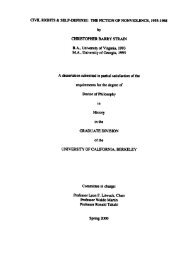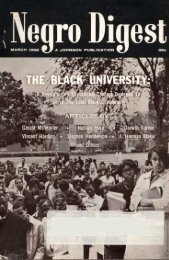Black News - Freedom Archives
Black News - Freedom Archives
Black News - Freedom Archives
Create successful ePaper yourself
Turn your PDF publications into a flip-book with our unique Google optimized e-Paper software.
The Case of Political<br />
Prisoners in the U.S .<br />
When the current President of the United<br />
States was running for office, one of his chief<br />
espousals was the issue of Human Rights,<br />
nationally and internationally .<br />
One of the principle things about this Human<br />
Rights Campaign was the case of Political<br />
Prisoners . Since Carter has become the 39th<br />
President of the United States, a lot of focus has<br />
been placed on Political Prisoners outside of the<br />
United States by the Administration . While the<br />
U .S . may point out the existence of Human<br />
Rights violations and Political Prisoners in other<br />
countries, and in some cases may also apply<br />
pressure to a government to release those<br />
prisoners, we cannot forget that, at the same<br />
time, the U .S . also extends economic, political,<br />
and military support to these same repressive<br />
governments . Chile, Argentina, and Iran are<br />
mentioned as examples . In so doing, the U .S .<br />
government is supporting the ability of these<br />
repressive governments to continue their reign of<br />
terror over the people . Also, the Administration<br />
blatantly and acutely ignores the issue of Human<br />
Rights and Political Prisoners at home . But the<br />
issues refuse to be obliterated or dismissed as<br />
non-existent or irrelevant .<br />
Defining these comrades as Political Prisoners i<br />
and Prisoners of War, coupled with the work of<br />
mobilizing people around these issues, is<br />
providing - us with better strategies and tactics<br />
that will enable those of us in the Prison<br />
Movement to be victorious in our task - the<br />
liberation of Political Prisoners and Prisoners of<br />
War in the United States .<br />
We see that the United States Ambassador to<br />
the United Nations, Andrew Young, has<br />
addressed himself to the issue of both Human<br />
Rights and Political Prisoners, but with no merit .<br />
When he spoke initially about it, he was 'rebuked<br />
by the Administration for such a stance although<br />
historically and politically, his stance had been<br />
lukewarm . The reproach served as a clear<br />
indication that the government is resisting, and<br />
will continually resist, any endeavor to expose<br />
and oppose its repressive and genocidal plans .<br />
There are varying definitions for the terms<br />
Political Prisoner and Prisoner of War (POW) ;<br />
the definitions given here are some functional<br />
ones, not presented as absolutes, or<br />
representative of every sector of the Prison<br />
ovement .<br />
One definition of Political Prisoners is that of<br />
activists who have been involved in political<br />
work in our communities and who get framed by<br />
the various law enforcement agencies . They are<br />
framed because the government deems them as<br />
being serious threats to its existence .<br />
A second definition reflects the case of<br />
comrades who, before they were confined, had<br />
not been politicized, but since their<br />
imprisonment have developed a progressive<br />
understanding of the capitalist system and act<br />
concordant to that understanding . Having<br />
developed such, they espouse their political<br />
convictions and are framed, beaten, maimed,<br />
killed, denied parole, etc .<br />
Thirdly, there are the innumerable brothers<br />
and sisters who are behind the prison walls who<br />
clearly are victims of "Class, Racial, and<br />
National Oppression ."<br />
Fourth, the definition of Prisoners of War are<br />
comrades captured while fighting a War of<br />
National Liberation against U.S . Imperialism .<br />
Some examples of brothers and sisters who<br />
serve as paragons of the aforementioned<br />
domestic Prisoners of War are Attica Brother<br />
Dacajeweiah (John Hill) ; the Five Puerto Rican<br />
Nationalists (Lolita Lebron, Oscar Collazo,<br />
Andres Figueroa Cordero, Rafael Cancel<br />
Miranda, and Irving Flores) ; the RNA Eleven ;<br />
the Native American comrades such as Russell<br />
Means, Leonard Peltier, Paul Skyhorse and<br />
Richard Mohawk ; <strong>Black</strong> Liberation Army<br />
soldiers such as Richard Dhoruba Moore,<br />
Anthony Bottom, Sundiata Acoli, Gabriel<br />
Torres, Francisco . Torres, Herman Bell, and<br />
Albert Washington ; Kamboa (Lorenzo Ervin) ;<br />
the Bedford Hills Sisters ; Atmore-Holman<br />
Brother Imani (Johnny Harris) ; Ruchell Magee ;<br />
the Marion Prison Brothers ; the August 8th<br />
Brigade Brothers ; Assata Shakur ; Attica Brother<br />
Jomo Omowale ; Geronimo Pratt ; the Statesville<br />
Brothers ; the Pontiac Brothers ; the Fountain<br />
Valley Five ; Gary Tyler ; Salvador Agron ; Malik<br />
(Robert Rice) of the Harlem Six .<br />
Support and work around Political Prisoners<br />
and Prisoners of War aids in the overall struggle<br />
against Racism, Repression, Exploitation,<br />
Colonialism, and U .S . Imperialism . On the<br />
outside, we struggle to overcome these evils,<br />
while prisoners inside fight similarly against<br />
them . There are certain distinctions, but the<br />
struggles are the same .<br />
When prisoners fight for minimum wages,<br />
establishment of a prisoner's union, and<br />
hazardous working conditions, we can see that<br />
these are part of our same struggle_ against<br />
exploitation.<br />
Attica Brother Akil Al-Jundi
















